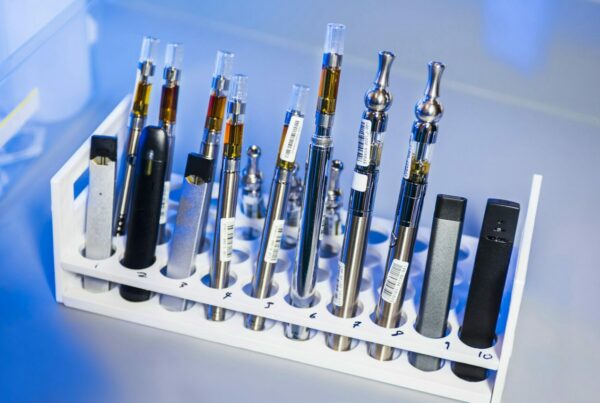N, N-Dimethyltryptamine, also known as DMT, is a compound commonly found in both plants and animals. It is known for its potent yet short-lived psychedelic effects when ingested.
Emerging evidence suggests that DMT, which naturally exists in the body, plays crucial roles in both the peripheral and central nervous systems and may serve as a neurotransmitter.
DMT is known to trigger powerful psychedelic effects. However, it generally doesn’t result in many adverse effects, aside from potential cardiovascular problems when administered in large doses via injection.
Let’s explore DMT and its diverse roles, which range from recreational use to its promising potential in scientific research and therapeutic applications.

A Brief Overview of DMT: What is it?
| Feature | Description |
| Name | N, N-Dimethyltryptamine (DMT) |
| Classification | Indole alkaloid |
| Occurrence | Occurs naturally in various plants and animals |
| Psychoactive Effects | Produces short yet intense psychedelic experiences when ingested. |
| Method of Consumption | Can be smoked, injected, or ingested orally. |
| Duration of Effects | Effects are brief, typically lasting between 5 to 30 minutes. |
| Chemical Structure | Features a tryptamine core with two methyl groups attached to the amine nitrogen atom. |
| Metabolism | Rapidly metabolized by the body and broken down by monoamine oxidase (MAO). |
| Cultural Use | Has been used historically in various ceremonial and shamanic rituals by indigenous cultures. |
| Other names | Dimitrifantasia, businessman’s trip, Businessman’s special, 45-minute psychosis, spiritual molecule |
The Role of DMT in Mental Health
N, N-Dimethyltryptamine (DMT), a compound famous for its potent psychedelic effects, is garnering attention for its potential benefits to mental health. Despite its conventional reputation for inducing powerful visionary experiences, recent studies suggest a connection between DMT and mental wellness.
Effects on Psychological and Emotional Well-being
DMT, known for its psychedelic effects, has the potential to elicit deep emotional reactions and alter states of consciousness. This capability might pave the way for new therapeutic approaches to mental health problems, aid in emotional processing, and offer new perspectives on personal traumas.
Neuroplasticity and Brain Function
Research suggests that DMT could influence neuroplasticity, thereby enhancing the brain’s ability to adapt and reorganize. Studying its impact on synaptic plasticity and neural connectivity may lead to potential treatments for conditions resulting from neural maladaptation.
Potential Therapeutic Use for Mental Health Disorders
Initial studies suggest that DMT could be beneficial in treating disorders such as depression, addiction, and PTSD. Its ability to induce mystical or spiritual experiences may offer a novel approach to psychotherapy and aid in transforming negative thought patterns.
Investigation into DMT’s natural presence in the body indicates its significance in mental health resilience, stress response, and overall psychological well-being. Understanding how the body controls internal DMT levels might lead to novel therapeutic strategies.
DMT and Mental Health Disorders
| Mental Health Disorder | Definition | DMT’s Effectiveness | Benefits |
| Depression | A mood disorder characterized by persistent sadness, disinterest, and decreased motivation | Preliminary studies suggest DMT could relieve symptoms by stimulating deeply emotional experiences. | DMT’s fast-acting nature and ability to induce transformative experiences may provide novel therapeutic approaches for altering negative thought processes and enhancing emotional processing |
| Post-Traumatic Stress Disorder (PTSD) | A disorder resulting from traumatic events, causing flashbacks, severe anxiety, and intrusive thoughts | Initial research indicates DMT’s potential to manage symptoms by inducing spiritual or mystical experiences that could help patients reframe traumatic memories | DMT’s potential to induce altered states of consciousness could facilitate emotional processing and offer a fresh perspective on traumatic experiences |
| Addiction | A complex disorder characterized by compulsive engagement in rewarding stimuli, irrespective of negative consequences | Some findings suggest DMT could disrupt addictive behaviours and lessen substance cravings | DMT’s ability to trigger intense and transformative experiences may assist individuals in modifying their behavioural patterns and addressing the root causes of their addiction |
Approaches to Using DMT
DMT, notorious for triggering short but intense psychedelic experiences, can be administered in a variety of ways. The chosen method often hinges on the desired intensity and duration of the experience.
Smoking:
If DMT is smoked in a pipe or vaporized, it is crucial to maintain a careful temperature control to avoid overheating and burning the compound. The psychedelic experience starts almost instantly when DMT is smoked, typically lasting from 5 to 15 minutes.
Oral Consumption:
Orally consuming DMT results in delayed effects which tend to last considerably longer, often several hours. This is due to the slow metabolism of DMT when combined with an MAOI.
Injection:
DMT can be directly injected into the bloodstream for rapid and intense effects.
This method leads to an immediate and potent experience, but it demands precise dosage and carries more risks.
Insufflation (Snorting):
Snorting DMT results in a slower onset of effects as compared to smoking but can provide an experience that lasts longer.
Sublingual or Buccal Administration:
When absorbed through the oral mucosa, this method serves as an alternative to smoking and delivers a less intense, yet longer-lasting experience.
Determining Therapeutic Doses: N, N-Dimethyltryptamine (DMT)
The suggested dosage for smoking is around 20 to 40 mg, while for intravenous administration, the recommended dosage is 0.2 to 0.4 mg per kg of body weight. These dosage recommendations are primarily relevant for clinical research, particularly for intravenous administration.
- High doses administered intravenously are associated with intense visuals, temporary loss of control, and a combined state of anxiety and euphoria
- Interestingly, lower doses have shown less desirable effects
- Recreational doses of smoked DMT typically range from 40 to 50 mg, sometimes even spiking up to 100 mg
- Various doses of intravenous Individuals who have experienced near-death episodes associated with DMT (in 7, 14, 18, and 20 mg solutions) have often reported significant and enduring enhancements in their psychological well-being.
Availability of DMT
ProductsOsmosis – 4-ACO-DMT Ethereal Essence Tincture
This tincture is marketed as containing 4-Acetoxy-N, N-dimethyltryptamine (4-AcO-DMT), a variant of DMT. Tinctures are liquid extracts designed for oral ingestion, and this particular product could offer a distinct experience from the typical DMT.
Lucid Supply Co. – 5-MeO DMT Vaporizer
This product is a vaporizer that delivers 5-Methoxy-N, N-dimethyltryptamine (5-MeO-DMT), renowned for its potent, transformative, and often short-lived experiences, with 5-MeO-DMT being its active component.
Integral Alchemist – Acacia – 1ml DMT Vape Cartridge
The DMT vape cartridge from Integral Alchemist comes pre-loaded with N, N-Dimethyltryptamine. This item is seemingly aimed at those who favor a discreet and convenient approach to consuming DMT.
Deadhead Chemist – 5-Meo-DMT Cartridge
This cartridge houses 5-Methoxy-N, N-dimethyltryptamine (5-MeO-DMT), a substance known for its deep and intense effects.
Potential psychological health benefits might be linked with personal growth, spiritual experiences, or therapeutic applications aimed at enhancing mental well-being.
Deadhead Chemist – N, N DMT Cartridge
Another offering from Deadhead Chemist, this cartridge houses the traditional N, N-Dimethyltryptamine. Cartridges present a user-friendly method of DMT consumption, providing a more consistent and stable experience.
Concluding Remarks
The utilization of N, N-Dimethyltryptamine (DMT) in
How can I ensure safe and responsible use of DMT products?
Mindful usage, including proper dosing and understanding the effects, is paramount.
Seeking advice from mental health professionals or seasoned users can provide valuable input on potential risks and rewards.
It’s crucial to comprehend your personal tolerance and mental preparedness, as well as to create a supportive, safe environment for the experience.
The journey of mental health therapy can be complex and exhilarating. The ability of the compound to induce intense, albeit temporary, psychedelic experiences creates opportunities for innovative therapeutic approaches.Preliminary research indicates its potential involvement in emotional regulation, personal development, and perhaps
The profound influence of mental health treatment necessitates careful consideration and responsible usage.
For those keen on responsibly exploring DMT products, reliable sources like Psychedelic Canada Online Dispensary are available to offer guidance and a variety of choices.
Frequently Asked Questions:
How do different DMT products affect mental health?
For instance, vaporizers may yield immediate effects, whereas tinctures or vape cartridges could provide more controlled and consistent dosages.
Incorporating derivative compounds or 5-MeO-DMT can result in varying levels of intensity and diverse effects on mental health.
These nuanced differences underscore the importance of selecting a DMT product based on individual needs and mental health goals.
Can DMT lead to enduring changes in mental health and personal development?
There’s anecdotal evidence indicating that DMT-induced experiences could have long-term effects on mental health and personal development.
Deeply moving or transformative experiences, such as those resembling near-death experiences, are often associated with reports of sustained positive changes in psychological health and personal development.
While these experiences are intense and ephemeral, they frequently result in self-examination, spiritual revelations, and a sense of unity or enlightenment.
Users often express a refreshed perspective on life, enhanced emotional resilience, and an amplified appreciation for life following these experiences.
How does DMT measure up to other psychedelic therapies like psilocybin or LSD in mental health treatment?
DMT’s effects, intensity, and duration set it apart from other psychedelics such as psilocybin or LSD. Its shorter duration
High-intensity, short-acting psychedelics like DMT necessitate unique therapeutic strategies in mental health, differing from those required for longer-lasting psychedelics.
Recommended Further Reading:





